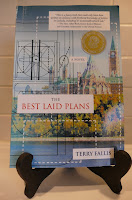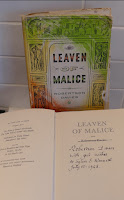75th Anniversary – 2022
Leacock Medal for Humour
The What’s So Funny Collection is
a set of all books honoured by the Stephen Leacock Memorial Medal for Humour.
It was assembled by Port Dover author Dick Bourgeois-Doyle in the process of
research and writing his book on the history of the award and past-winners (What’s
So Funny? Lessons from the Leacock Medal for Humour (Burnstown Publishing). The
collection, which includes many autographed, first edition versions is being
exhibited the year to mark the 75th anniversary of the award.
Books in the collection include.
The Best Laid Plans, Terry Fallis,
2008
Original Self-Published Version
The Best Laid Plans, the political satire, and its author Terry Fallis are widely
celebrated today. The book not only won the 2008 Leacock Medal but also the
2011 Canada Reads competition. It was later developed as a TV series and
a stage musical. But Fallis was largely unknown
before this success and had to publish the book at his own expense. A publishing deal with McClelland &
Stewart followed his Leacock Medal win and the book has since been reformatted
and distributed widely. This copy,
autographed by Fallis in 2009, is one of those early self-published,
print-on-demand versions.
Just Add Water and Stir, Pierre Berton, 1960
Review copy addressed to Eric
Nicol
Vancouver columnist and three-time Leacock Medal winner Eric Nicol was a
shy student at UBC in the 1940s. He was
enticed into writing for the student newspaper under a pseudonym proposed by
the editor, the future icon of Canadian journalism Pierre Berton. Berton gave Nicol the pen name “Jabez”, a
biblical word meaning “he who causes sorrow.”
Years later when Berton himself won a Leacock Medal for his essay
collection Just Add Water and Stir, he sent one of the pre-launch review copies to Nicol
with the inscription “For Jabez from an old admirer.” This is that book.
Leaven of Malice, Robertson Davies, 1955
First Edition/First Printing, signed
When Robertson Davies died in 1995, he was celebrated as one of Canada's most popular authors and distinguished “men of
letters.” He was a prolific novelist,
playwright, critic, essayist, and academic. But when he wrote the 1955 Leacock
Medal winner Leaven of Malice, his day job was as Editor of the
Peterborough, Ontario Examiner, one of his family’s newspaper holdings.
The book, the second in his trilogy of stories based in the imaginary town of
Salterton, follows an adventure focused on the local newspaper editor. This is a first-edition/first-printing copy
of the book and carries Davies’ distinctive signature.
Ojibway Melody,
Harry Symons, 1947
Self-Published
version, signed
Ojibway Melody:
Stories of Georgian Bay by Harry Symons was the inaugural winner
of the Leacock Medal in 1947. On the
surface, the book may seem like a light-hearted and simple celebration of summers
in Ontario cottage country. But many
scholars including the author’s son, Tom Symons who was the first president of
Trent University, see deeper meaning, special tolerance, and caring in the book’s
passages. The book helped inspire the
first academic programs in Canadian and Indigenous Studies. This copy of the book was printed in the
1940s and was signed by the author two years before he died in 1962.
Sarah Binks, Paul
Hiebert, 1948
– Willows Revisited
Inscribed, Hand-written Poem
Many consider Sarah Binks, the
1948 Leacock Medal winner, by University of Manitoba Professor Paul
Hiebert to be iconic Canadian humour.
The book is a gushing, over-the-top mock biography wrapped around a
collection of bad poetry. In it, the imaginary Sarah is celebrated as the greatest
poetess in the history of Saskatchewan and an expert on farm animals. This
first edition/first printing copy was signed by Hiebert for his friends Don and
Helen Penner, a couple famous for their contributions to medicine. This accompanying copy of Willows
Revisited, Hiebert’s sequel to Sarah Binks, has a hand-written poem
by the author in the back.
Sunshine Sketches of
a Little Town,
Stephen Leacock
First Edition (1912)
– Plus Frenzied Fiction (1917) signed by Leacock
Stephen Leacock was regarded as the most
popular humorist in the English-speaking world at the height of his fame. He was exceptionally prolific as a humour
writer as well as being a respected professor of political economy. His best-known work remains Sunshine
Sketches of Little Town, the book of stories associated with his summers in
Orillia, the town where the Leacock Medal award was initiated. This is a first
edition, early printing of Sunshine Sketches which first appeared in
1912. The book that carries Leacock’s
signature is a first edition, first printing copy of Frenzied Fiction, published
in 1917.
Generica
(Happiness), Will Ferguson, 2002
Signed First edition
under original title
When, in 2002, Will Ferguson won his
first of three Leacock Medals (the others were for Beauty Tips from Moose
Jaw in 2005 and Beyond Belfast in 2010), he received the award for a
book that, in a sense, no longer existed.
By the time the medal was awarded for the novel Generica, it had
been rebranded by its publisher as the more accessible Happiness. With this revised title, the book went on
to best seller lists and bookstore shelves around the world. This copy is one
of those printed under the original title and was signed by the author.
Turvey, Earle
Birney, 1950
Signed, First Edition/First
Printing plus
Revised 1976 Unexpurgated Edition
When celebrated educator and poet Earle
Birney tried to get his WWII picaresque novel Turvey published in the
1940s, he struggled. British and U.S.
publishers didn’t appreciate all of the Canadian themes and references. Canadian ones balked at the swearing and
“army talk.” Birney finally acquiesced, and the book was published with the
swear words edited out. It went on to
win the Leacock Medal in 1950, and it inspired radio plays and stage productions. This is a signed copy of this original
version of Turvey along with a colorful, 1976 revision with Birney’s
original wording put back in.
The Boat Who
Wouldn’t Float, Farley Mowat, 1970
Signed Postcard –
Pipe
Environmentalist and writer Farley Mowat
wrote close to 50 books, sold millions, and saw his works published in many
languages. Yet The Boat Who Wouldn’t
Float, Mowat’s humorous account of his 1960s adventures sailing a leaky
boat along the east coast of Canada had a special place in his hear. It not only won the Leacock Medal in 1970,
but also described his meeting Claire, the woman who would become his
wife. This 1971 hard copy of the book
accompanies a postcard from Farley and Claire sent just prior to the author’s
death at the age of 92 in 2014 as well as one of Farley’s pipes.
The Outside Chance
of Maximillian Glick,
Morley Torgov, 1983
First Edition, signed paperback
The 1983 Leacock Medal winner had a significant impact on Canadian culture as a portal on Jewish life in small town Ontario. The author, Toronto lawyer Morley Torgov, drew upon his personal experiences as well as a true story to paint a vivid picture that inspired a popular motion picture as well as a TV series that made the name Maximillian Glick well known across Canada. This copy of the book is a first edition hard
cover accompanied by a paperback version, published after the book had achieved
its varied success and is autographed by the now 94-year-old author (2022).













